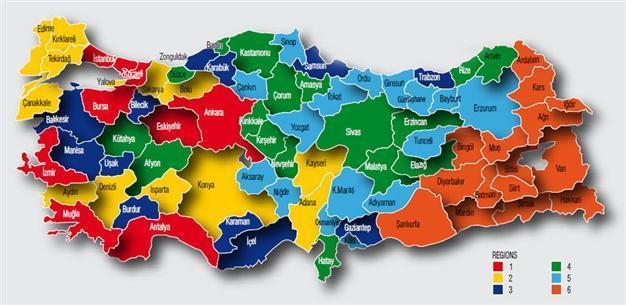Incentive scheme to balance regional income, reduce current account gap
ISTANBUL- Hürriyet Daily News

The map below ranks provinces according to their standings in the new incentive system. Istanbul, Ankara and Bursa are among the most developed provinces. However, the government exempts some historic sites there to attract investments.
Turkish Prime Minister Recep Tayyip Erdoğan announced yesterday a new incentive scheme to prop up local and foreign investments, while supporting underdeveloped regions.The updated scheme is aimed at reducing dependency on imported intermediate goods and the country’s current account deficit, as well as at contributing to the structural reformation of the country’s industrial sector and balancing out the differences between regions, he said.
A new feature of the incentive scheme is that provinces, now ranked in terms of social-economic development, will fall under six groups in terms of priority of incentives. The provinces in the sixth group, mostly consisting of poorer eastern and southeastern provinces, will receive the most investment support. The government will pay the employee insurance costs on the minimum wage for 10 years for investments made in sixth-category provinces.
Strategic investments
The government is hereby adding a pillar of “promoting strategic investments” to its current incentive scheme based on three pillars, Erdoğan said in Ankara while announcing the program with cabinet members.
Strategic investments involving education, transportation, mining and some tourist destinations will receive incentives at the level granted to the fifth province group, regardless of the province the strategic investment is made in.
“With this new system we primarily hope to increase production and investments in the area of intermediary goods and products, which currently have a high degree of import dependency, so as to cut the current account deficit,” Erdoğan said.
The new scheme went into effect for all investments agreed after Jan. 1 this year. “With the new system we will initiate value added tax exceptions, customs tax exemptions, tax reductions, and reduce the insurance premiums employers pay,” Erdoğan said. The new measures are also aimed at attracting foreign investors.
One significant incentive reform allows investors to apply tax reduction support to all the revenues obtained during the period of the supported investment. For instance, an investor could deduct a certain percentage of the cost of an investment from revenues obtained in other businesses.
Erdoğan said the program placed special importance on strategic investments in the defense, aviation and aerospace industries, as well as on the biochemical industry, which he said would receive standard incentives at the rates designated for the fifth least-developed region in the country. The rankings of the provinces are based on data from the Turkish Statistical Institute (TÜİK). Erdoğan said the incentive categories provinces fall into may change according to fresh data from TÜİK. Touching on the ambitiousness of the government’s growth plan, he said, “God willing, we aim to be one of the largest national economies, with $2 trillion of income by the 100th anniversary of the foundation of our republic [in 2023].”
















